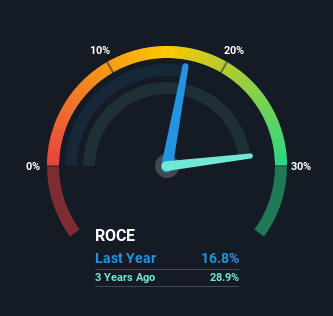- Hong Kong
- /
- Trade Distributors
- /
- SEHK:1891
Be Wary Of Heng Hup Holdings (HKG:1891) And Its Returns On Capital

What trends should we look for it we want to identify stocks that can multiply in value over the long term? Typically, we'll want to notice a trend of growing return on capital employed (ROCE) and alongside that, an expanding base of capital employed. Put simply, these types of businesses are compounding machines, meaning they are continually reinvesting their earnings at ever-higher rates of return. Having said that, from a first glance at Heng Hup Holdings (HKG:1891) we aren't jumping out of our chairs at how returns are trending, but let's have a deeper look.
Return On Capital Employed (ROCE): What is it?
If you haven't worked with ROCE before, it measures the 'return' (pre-tax profit) a company generates from capital employed in its business. To calculate this metric for Heng Hup Holdings, this is the formula:
Return on Capital Employed = Earnings Before Interest and Tax (EBIT) ÷ (Total Assets - Current Liabilities)
0.17 = RM34m ÷ (RM259m - RM53m) (Based on the trailing twelve months to June 2021).
So, Heng Hup Holdings has an ROCE of 17%. In absolute terms, that's a satisfactory return, but compared to the Trade Distributors industry average of 4.9% it's much better.
View our latest analysis for Heng Hup Holdings

While the past is not representative of the future, it can be helpful to know how a company has performed historically, which is why we have this chart above. If you're interested in investigating Heng Hup Holdings' past further, check out this free graph of past earnings, revenue and cash flow.
What Can We Tell From Heng Hup Holdings' ROCE Trend?
On the surface, the trend of ROCE at Heng Hup Holdings doesn't inspire confidence. Around five years ago the returns on capital were 32%, but since then they've fallen to 17%. Although, given both revenue and the amount of assets employed in the business have increased, it could suggest the company is investing in growth, and the extra capital has led to a short-term reduction in ROCE. And if the increased capital generates additional returns, the business, and thus shareholders, will benefit in the long run.
On a related note, Heng Hup Holdings has decreased its current liabilities to 21% of total assets. That could partly explain why the ROCE has dropped. Effectively this means their suppliers or short-term creditors are funding less of the business, which reduces some elements of risk. Some would claim this reduces the business' efficiency at generating ROCE since it is now funding more of the operations with its own money.
Our Take On Heng Hup Holdings' ROCE
In summary, despite lower returns in the short term, we're encouraged to see that Heng Hup Holdings is reinvesting for growth and has higher sales as a result. Furthermore the stock has climbed 57% over the last year, it would appear that investors are upbeat about the future. So should these growth trends continue, we'd be optimistic on the stock going forward.
If you'd like to know more about Heng Hup Holdings, we've spotted 2 warning signs, and 1 of them makes us a bit uncomfortable.
For those who like to invest in solid companies, check out this free list of companies with solid balance sheets and high returns on equity.
Valuation is complex, but we're here to simplify it.
Discover if Heng Hup Holdings might be undervalued or overvalued with our detailed analysis, featuring fair value estimates, potential risks, dividends, insider trades, and its financial condition.
Access Free AnalysisHave feedback on this article? Concerned about the content? Get in touch with us directly. Alternatively, email editorial-team (at) simplywallst.com.
This article by Simply Wall St is general in nature. We provide commentary based on historical data and analyst forecasts only using an unbiased methodology and our articles are not intended to be financial advice. It does not constitute a recommendation to buy or sell any stock, and does not take account of your objectives, or your financial situation. We aim to bring you long-term focused analysis driven by fundamental data. Note that our analysis may not factor in the latest price-sensitive company announcements or qualitative material. Simply Wall St has no position in any stocks mentioned.
About SEHK:1891
Heng Hup Holdings
An investment holding company, engages in the trading of scrap ferrous metal in Malaysia.
Solid track record with adequate balance sheet.
Market Insights
Community Narratives



